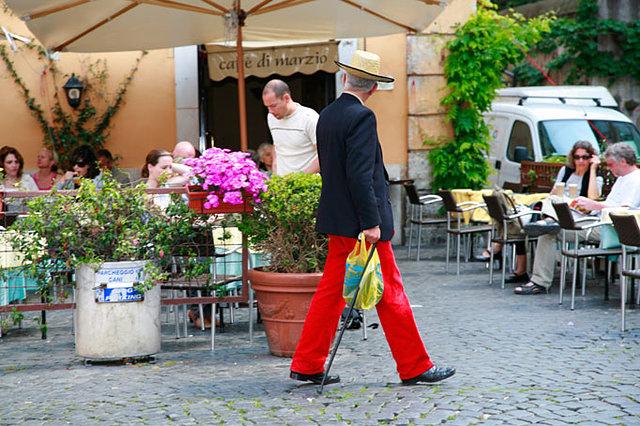The way we were in 2013. A year of opinion polls tells us a lot more than who we'd vote for: it tells us who we are.
What are our secret dislikes?
They’re an odd bunch. Many of us (46%) hate red trousers, or men wearing them at any rate. Those polled said the first words to spring to mind on seeing such a man were “idiot”, “brave” and “prat” (YouGov/Telegraph). Nor do we like tripe: 30% of those who’ve tried it have vowed never to do so again; 25% say the same of whisky (Ask Jeeves/Mail). Many women (31%) say they don’t like their husband’s surname and wish they’d kept their own (Siteopia/Mail). And nightclothes aren’t popular with women in London. 73% say they prefer to sleep naked or in their knickers. But 87% of women in the North favour long-sleeved tops and pyjamas (Telegraph).

What one item has most affected us?
The mobile phone. An astonishing 54% of us claim to suffer from nomophobia, the fear of being without your mobile. 42% of those who have one check for messages on the beach, 25% during a dinner date and a fifth when they’re in bed (OnePoll/Telegraph). 49% of 18 to 24-year-olds regularly check theirs while eating en famille (Mars/Telegraph). But American teens are even more obsessive about their “cell phones”: a third of them receive and send 100 texts a day, about ten every waking hour (Independent).

And how are our teenagers faring?
There’s only one language most of them understand. A mere 9% of 15-year-olds in the UK speak a foreign language – the average in the 14 EU countries polled was 42% (Independent). 18% of 16 to 25-year-olds believe they’ll end up on benefits for at least part of their lives (Prince’s Trust/Mail). 40% of British teens say they’ve created sexual images on their phones and 25% have sent them via text messages (NSPCC/Telegraph). And every year the average teenage girl has 183 rows with her mother, slams 164 doors, has 127 fights with her friends and cries over a boy 123 times (Mail).
How are we coping with our children?
Often with grandparental support. Half of new mothers “depend” on their own parents for help and 75% of grandparents oblige, even though 36% of grandmothers now work full time (IPPR/Sunday Times). But the supply of grandchildren to care for is shrinking: a generation ago 82% of 60-year-olds had grandchildren; now just 56% do (Times). The practice of reading bedtime stories still continues: 64% of parents with children under seven read to them; but only 13% do so every night. Three bedtime stories a week is the average (Littlewoods/Guardian). And only 28% of children now say they read for pleasure – down from 38% in 2005 (National Literacy Trust/Telegraph).

And has the gender balance altered?
Boys are no longer seen as the natural breadwinners: 38% of parents believe their son’s financial future depends on him finding a rich wife; only 32% think their daughters need a rich husband (Scottish Widows/Telegraph). Increasingly, women are bringing home the bacon: 40% of British women in long-term relationships earn more than their partners (Sunday Times). In the home, it’s women who still make the day-to-day decisions: they buy 93% of all groceries, 92% of holidays, and – more surprisingly – 60% of all new cars and 55% of home computers (Buckingham New University/IoS). They also decide when their partner’s wardrobe is no longer fit for purpose: 43% admit they’ve thrown away items of his clothing; one in seven say they have deliberately put undesirable items in the wrong wash (M&S/Oxfam/Times).
So are we a slovenly nation?
We don’t keep our homes that spic and span. 57% of us admit they sometimes resemble a pigsty; a third of us are too busy ever to clean them (Spontex/Mail). 58% of British men admit they’ve damaged their homes with their DIY (Disney/Mail). Nor are we that fussed about keeping clean: 41% of men and a third of women say they don’t shower or bathe daily (Siteopia/Mail). And many of us don’t bother with exercise: a quarter of British adults walk for less than nine minutes a day (IoS).
Have we anything to be proud of?
Yes. Our community spirit. 78% of us feel a strong sense of belonging to a neighbourhood; 72% have volunteered formally or informally in the past year; 50% say they exchange favours with their neighbours (Community Life/IoS). We’re also one of the world’s most racially tolerant nations: less than 5% say they’d mind having neighbours of a different race – compared to 23% in France (World Values Survey/ Mail). Alas, that’s not enough to make us the nation generally regarded as having the most positive impact on the world. In a poll taken across 25 countries, that honour, endorsed by 59%, went to... Germany (Country ratings poll/BBC).
Statistics of the year
68% of the bagged salad bought and sold by Tesco never makes it onto the plate. - The Independent
Last year there were 12,320 centenarians in Britain, up from 2,420 in 1981. - The Guardian
There have been fewer than 20 terror-related deaths on US soil since 9/11, but around 364,000 caused by privately owned firearms. - The Observer
One in ten drivers have fallen asleep at the wheel, travelling an average of 85 metres with their eyes closed. - The Daily Telegraph
One in 20 Britons have paid a bribe to a public official in the past 12 months – up from one in 100 in 2010. - The Independent
The average Briton sleeps for 6hrs 41mins a night. People in Coventry get the least sleep (6hrs 5mins), and those in Aberystwyth get the most – 7hrs 30mins. - Travelodge/Daily Mail
During a 90-minute game, each footballer is in possession of the ball for just 53.4 seconds, on average. - The Times
The UK is home to three times more millionaire bankers than all the other EU countries put together. - The European Banking Authority/The Times
The number of people being fed by charity food banks has risen 200% since April. - Trussell Trust/The Guardian
There are 3.1 million rats in British cities. That means city dwellers are typically around 164ft from a rat – not 6ft, as commonly believed. - The Guardian


